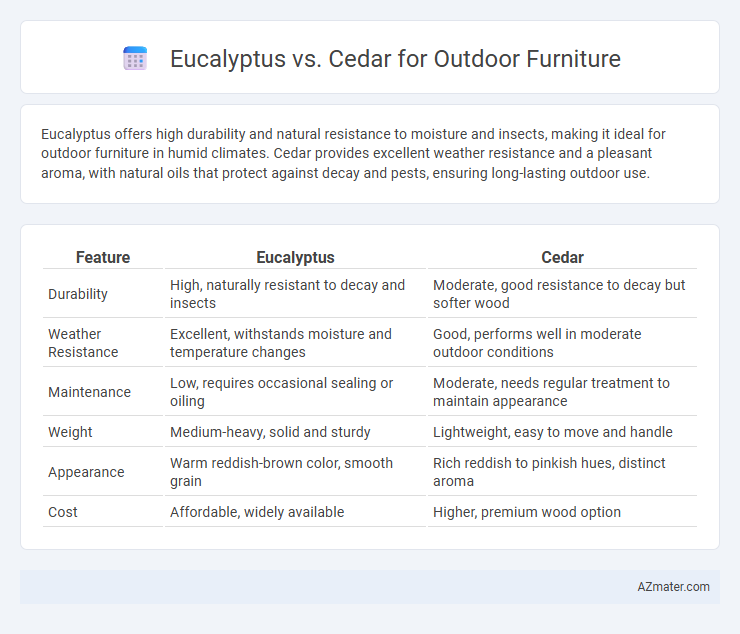Eucalyptus offers high durability and natural resistance to moisture and insects, making it ideal for outdoor furniture in humid climates. Cedar provides excellent weather resistance and a pleasant aroma, with natural oils that protect against decay and pests, ensuring long-lasting outdoor use.
Table of Comparison
| Feature | Eucalyptus | Cedar |
|---|---|---|
| Durability | High, naturally resistant to decay and insects | Moderate, good resistance to decay but softer wood |
| Weather Resistance | Excellent, withstands moisture and temperature changes | Good, performs well in moderate outdoor conditions |
| Maintenance | Low, requires occasional sealing or oiling | Moderate, needs regular treatment to maintain appearance |
| Weight | Medium-heavy, solid and sturdy | Lightweight, easy to move and handle |
| Appearance | Warm reddish-brown color, smooth grain | Rich reddish to pinkish hues, distinct aroma |
| Cost | Affordable, widely available | Higher, premium wood option |
Overview: Eucalyptus vs Cedar for Outdoor Furniture
Eucalyptus offers a dense, durable wood with natural resistance to rot and insects, making it ideal for outdoor furniture that withstands varying weather conditions. Cedar, known for its lightweight and aromatic qualities, provides excellent decay resistance and insect repellence, contributing to long-lasting outdoor pieces with minimal maintenance. Both woods balance strength and aesthetic appeal, but eucalyptus generally delivers superior hardness while cedar excels in natural preservation and a distinctive scent.
Durability and Longevity Comparison
Eucalyptus wood offers high durability due to its natural resistance to decay and insect attacks, making it ideal for outdoor furniture exposed to varying weather conditions. Cedar also boasts excellent longevity, with inherent oils that repel moisture and insects, preventing warping and cracking over time. When comparing eucalyptus and cedar, eucalyptus tends to be harder and more resistant to wear, while cedar excels in maintaining structural integrity and a stable appearance in humid environments.
Weather Resistance and Performance
Eucalyptus wood offers superior weather resistance due to its high natural oils and dense grain, making it highly durable against moisture, decay, and insect attacks in outdoor furniture. Cedar wood, while also weather-resistant and lightweight, contains natural oils that repel insects but is generally softer and more prone to scratching and denting compared to eucalyptus. Eucalyptus's robustness ensures longer-lasting performance in harsh climates, whereas cedar requires more frequent maintenance to preserve its appearance and structural integrity.
Maintenance Requirements and Care
Eucalyptus wood requires regular sealing and oiling to maintain its natural resistance to moisture and prevent cracking or warping when used for outdoor furniture. Cedar contains natural oils that provide inherent resistance to rot, insects, and decay, reducing the frequency of maintenance compared to eucalyptus. Both woods benefit from periodic cleaning and protective finishes, but cedar generally offers lower maintenance demands due to its durable, weather-resistant properties.
Aesthetic Differences and Visual Appeal
Eucalyptus wood offers a warm reddish-brown hue with a smooth, consistent grain that ages beautifully into a silvery-gray patina, creating a rustic yet elegant outdoor furniture look. Cedar features a rich amber to reddish-brown tone with pronounced knots and a straight grain, providing a natural, rugged charm with a distinct aromatic presence that enhances visual and sensory appeal. While eucalyptus near-uniformity suits modern minimalistic designs, cedar's textured and aromatic surface complements traditional, cozy outdoor settings.
Cost and Affordability Analysis
Eucalyptus outdoor furniture offers a cost-effective option due to its fast growth and sustainable harvesting, making it generally more affordable than cedar. Cedar furniture commands a higher price point because of its natural resistance to decay, insect repellent properties, and longer lifespan, which can justify the initial investment. Evaluating long-term maintenance costs is crucial; eucalyptus may require more frequent treatments to maintain durability, while cedar's inherent stability reduces upkeep expenses over time.
Sustainability and Environmental Impact
Eucalyptus and cedar are popular choices for outdoor furniture due to their durability and natural resistance to decay, with eucalyptus being a fast-growing hardwood that supports sustainable forestry practices through quick regeneration cycles. Cedar, while slower growing, is highly valued for its natural oils that repel insects without chemical treatments, reducing environmental toxins. Eucalyptus furniture often has a lower environmental impact during production because of shorter harvest cycles, whereas cedar's longevity and biodegradability contribute positively to long-term sustainability.
Suitability for Various Climates
Eucalyptus wood offers excellent resistance to moisture and decay, making it highly suitable for humid and wet climates, while cedar's natural oils provide superior insect and rot resistance, ideal for dry and moderate environments. Both woods possess durability for outdoor use, but eucalyptus performs better in consistently damp conditions due to its dense grain. Cedar is favored in areas with fluctuating weather because it remains dimensionally stable and resists warping under temperature changes.
Pros and Cons: Eucalyptus vs Cedar
Eucalyptus outdoor furniture offers durability and natural resistance to rot and insects, making it a cost-effective, eco-friendly choice that ages to a beautiful silver-gray patina but requires regular maintenance to prevent drying and cracking. Cedar furniture provides excellent resistance to moisture, decay, and insect damage, with a lightweight structure and pleasant aroma that repels pests, yet it can be softer and more prone to dents and scratches over time compared to eucalyptus. Both woods withstand outdoor conditions well, but eucalyptus is denser and harder, while cedar's natural oils enhance weather resistance and reduce the need for frequent sealing.
Final Recommendations for Outdoor Furniture Buyers
Eucalyptus offers excellent durability and natural resistance to decay, making it a cost-effective and eco-friendly choice for outdoor furniture. Cedar provides superior resistance to moisture and insects, along with a pleasant aroma that enhances outdoor environments. For long-lasting outdoor furniture, buyers seeking budget-friendly options should choose eucalyptus, while those prioritizing premium aesthetics and natural insect resistance should opt for cedar.

Infographic: Eucalyptus vs Cedar for Outdoor Furniture
 azmater.com
azmater.com